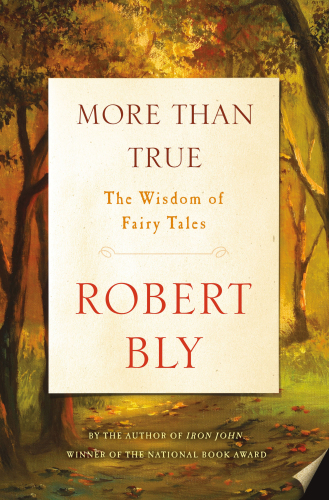
More Than True
The Wisdom of Fairy Tales
- اطلاعات
- نقد و بررسی
- دیدگاه کاربران
نقد و بررسی

October 2, 2017
Acclaimed poet and essayist Bly (Talking into the Ear of the Donkey) meditates on human nature in his erudite but uneven analysis of six fairy tales and the wisdom they contain. Choosing obscure fairy tales such as the Scandinavian “The Lindworm” and the Native American “One-Two Man,” in addition to the well-known “The Frog Prince,” Bly whimsically retells the often idiosyncratic stories in vibrant detail. Not content with discussing the obvious meanings and announced messages of his selections, Bly instead launches into extensive studies of the psychological subtext behind each one, such as how “The Frog Prince” illustrates the process of moving past “the cold-blooded part of ourselves.” He dissects their essences with help from the theories of such thinkers as Jung, Kafka, Shelley, and Wang Wei, and he ornaments these ideas with excerpts from his own poems, many never before published. While beautiful, these poems serve as a distraction at times from Bly’s philosophical insights, emphasizing his own words over the fairy tales themselves. Bly’s many admirers won’t mind, but readers new to his work may find this gorgeously written book less than the sum of its parts.

January 1, 2018
The celebrated poet offers a personal reading of fairy tales.Revisiting subjects previously explored in Iron John and The Maiden King, National Book Award winner Bly (Stealing Sugar from the Castle: Selected Poems, 1950-2013, 2013, etc.) wants to use his "intuition and write about stages of men's growth as I see them in these tales." For the author, these stories "are amazing trees of sound that grow inside the human memory and are fed by some longing for intimacy with others." In them, the "psyche is trying to communicate what it knows, trying to slip something past the guards of the dictator ego." Bly is influenced in his interpretive retellings by some "astonishing thinkers" (Kierkegaard, Yeats, etc.) and "those two old clowns, Freud and Jung." The author first recounts each story in his own words and then informally discusses it ("let's pause for some comments here....But back to the story again") in the light of a variety of sources and poets. In addition to studying the works of others, Bly includes some of his own poems, a few previously unpublished. "One part of us is educated and one is not, particularly the feeling side, for men," he writes. "I want to write poems for each side that both parts can understand." The story of the "White Bear King Valemon," for example, "offers us many glimpses into the divine world, which are difficult for those of us brought up in a culture that prefers not to talk seriously of spiritual excess." Some readers may be bothered by Bly's "intuitive," philosophical ruminations on the stories, but he hopes that the "conscious mind may receive the fragrance of the old stories, tales told centuries ago by male and female geniuses."Idiosyncratic readings by a generous, gifted writer who asks his readers to be open to a story's poetry, its "light by which we may see life."
COPYRIGHT(2018) Kirkus Reviews, ALL RIGHTS RESERVED.

February 15, 2018
It seems appropriate for a poet to delve into the psychology of fairy tales, and indeed, Bly (Stealing Sugar from the Castle, 2013) describes fairy tales as amazing trees of sound that grow inside the human memory. Bly seeks to explain the expanding influence six particular tales have had on literature, his own writing, and the common struggle to understand one's self. Bly summarizes each story in a convivial tone, as if he was sitting beside the reader before a hearth. The tone then shifts as he takes up the hard work of extracting meaning from each tale. This can be, at moments, abrupt, and the explanations are often fraught with psychological abstraction. Understanding storytelling in this way, however, provides the reader deeper appreciation of the seemingly whimsical tales of kings, witches, princes, damsels, frogs, worms, and dark forests. Bly's many readers will be delighted by the new poetry entwined with his literary explications, and fairy-tale enthusiasts will be heartened to read about obscure tales and versions of familiar ones that challenge and enrich the canon.(Reprinted with permission of Booklist, copyright 2018, American Library Association.)




دیدگاه کاربران